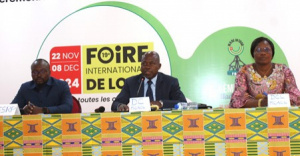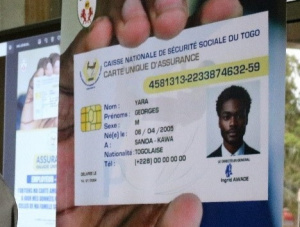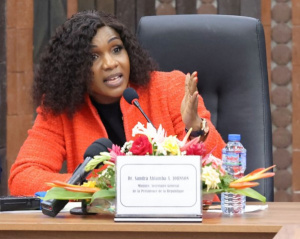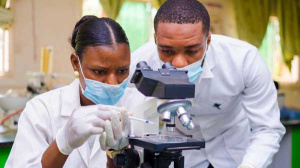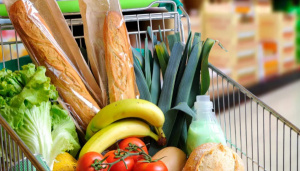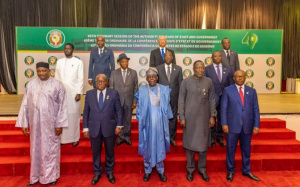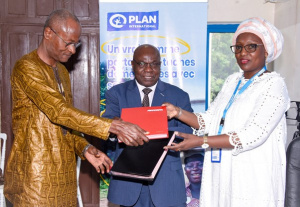Togo First
World Bank and Togo Sign $298 Million in New Financing Agreements
The World Bank and the Government of Togo signed three new financing agreements last Friday, July 12. Totaling $298 million, the funds will help Togo boost access to electricity, improve public service delivery, and foster social cohesion.
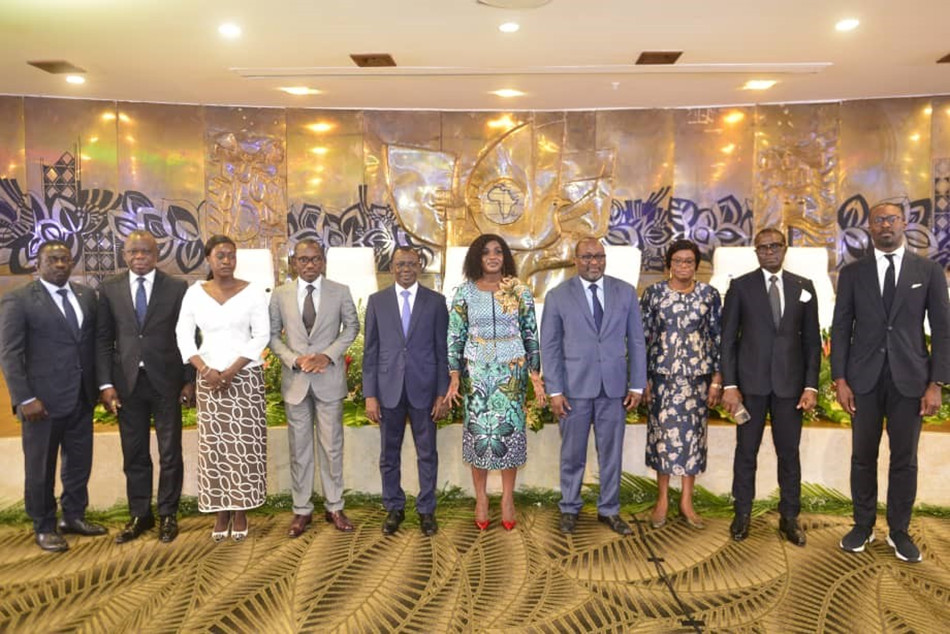
The deals were inked by the World Bank’s Resident Representative and Togo’s Minister of Finance, Fily Sissoko and Sani Yaya, respectively. The signing ceremony was chaired by Sandra Ablamba Johnson, Minister Secretary General of the Togolese Presidency and World Bank Governor for Togo. Other officials present include the ministers of energy, civil service, social action, and universal healthcare.
Three Deals, Three Projects
The three deals are for three projects, including the Inclusive Development through Access to Electricity project (IDEA), the Togo Public Sector Strengthening for Service Delivery Operation
(PforR), and the Gulf of Guinea Northern Regions Social Cohesion Project (COSO). Respectively $200 million, $75 million, and $23 million were disbursed for the projects.
Funds allocated to IDEA will be used to build 161kV transmission lines, providing electricity to over 1.5 million people, mainly in rural areas. The project also aims to strengthen the sector's institutional capacity and reduce greenhouse gas emissions by expanding renewable energy.
The second project, the PMAPDS will improve the management of human resources and public finances, modernize public administration, digitize tax revenue collection, and increase digital payments.
The $23 million disbursed for the COSO project will support refugees and their host communities.
"I am grateful to the World Bank Group for supporting our determination to tackle our major roadblocks to sustainable development," said Sani Yaya, Minister of Economy and Finance.
Over $600 Million Combined
Besides the three deals, thanks to a special waiver, Togo also secured an additional $315 million from the World Bank Group's Prevention and Resilience Window, resulting in cumulative funding of over $600 million for the country.
Commenting on the development, Sandra Johnson declared: "Emphasis should be placed on the impact for which these projects were initiated. This is why I am inviting us to greater celerity, a sense of urgency and realistic planning in the delivery of services, and greater efficiency in spending to achieve the goals set for our people’s good…These impacts must be felt in the daily lives of Togolese, whether women, young people, farmers, artisans, or any citizen."
New Country Partnership Framework
The signing ceremony took place on the sidelines of the presentation of the World Bank's new Country Partnership Framework (CPF) with Togo for 2025-2029, which aims to reduce poverty, increase shared prosperity, and promote sustainable development through the creation of quality jobs, improvement of human capital, and inclusive and sustainable territorial development.
Ayi Renaud Dossavi
Togo: National Local Consumption Strategy Validated
The Togolese Ministry of Trade, Handicrafts, and Local Consumption, together with representatives of public administrations and economic operators, validated the National Strategy for Local Consumption on July 10, 2024.
This strategy is built around three main pillars. Firstly, it aims to make local goods and services more competitive. Secondly, it seeks to increase the visibility and accessibility of local products. Thirdly, it aims to improve the governance of local consumption.
The new strategy is key to boosting local consumption, according to Koffi Vinyo Mensah, the Secretary General of the Ministry of Trade. The official believes it will foster the national economy by valorizing the know-how of artisans, very small and medium-sized enterprises, as well as other promoters of local goods and services.
Moreover, local consumption is a source of job and wealth creation, particularly for young people and women.
The National Strategy for Local Consumption is supported by the World Bank Group and is part of Axis 2 of the government's 2020-2025 roadmap. This axis aims to bolster job creation by leveraging the economy’s strengths.
Esaïe Edoh
Togo's Universal Health Insurance Covers 800,000 People in First Six Months
Togo's new universal health insurance program has already enrolled 800,000 people. The program was launched in January 2024.
The figure is nearly 50% more compared to the 470,000 people previously covered by the National Health Insurance Institute (INAM).
The rapid growth in enrollment for the new universal health insurance program demonstrates Togo's commitment to improving access to healthcare for all its people, regardless of their economic status or occupation. In line with this ambition, the government has allocated an additional CFA1.5 billion to the national drug procurement agency, CAMEG Togo, to acquire more generic medicines.
The universal health insurance scheme is being implemented through two main institutions–the National Social Security Fund (CNSS) and the INAM-. The former covers private sector workers and the latter public sector employees.
Esaïe Edoh
Togo Ranks First Among UEMOA Countries in Latest Human Development Index
Sandra Johnson, Secretary General of Togo’s Presidency, met the press people last week on July 4. She told them about the steps that allowed the country to rank first among WAEMU countries in the latest Human Development Index (HDI) report. Johnson was with Yawa Kouigan, the Minister of Communication.
Togo scored 0.547 in 2023-2024 on the report, against 0.539 in 2021-2022. This is the fifth consecutive year that the country tops the ranking at the WAEMU level. It was fourth at the ECOWAS level.
Madame @SandraA_JOHNSON, Ministre, Secrétaire général de la Présidence de la République a présidé ce 04 juillet 2024 à Lomé, un atelier de dissémination à l’endroit des médias sur l’Indice de développement humain (IDH), en présence de Madame @YawaKouigan, ministre de la… pic.twitter.com/LTLRlmwaVh
— Présidence Togolaise/Togolese Presidency (@PresidenceTg) July 4, 2024
"Togo has chosen human-centered development, the most difficult process in economics," Sandra Johnson told the press.
The achievement is attributable to Lomé’s increased efforts in key human development sectors, such as health, education, access to drinking water and electricity, improving the living environment, infrastructure, agriculture, and food security. Togo can now aim to move into the medium HDI category, with a score of at least 0.550.
The HDI is a composite index created by the United Nations Development Program (UNDP) to assess human development in the world's countries. It is essentially based on three main criteria: health and longevity, level of education, and standard of living.
Togo Achieves Significant Progress in Healthcare Accessibility, Reaching 90.7% Coverage in 2023
Togo's healthcare accessibility rate increased from 71% in 2020 to 90.7% in 2023, according to a report by the Presidency of the Republic. Published on July 4, 2024, the document includes the latest Human Development Index (HDI) figures.
According to the report, key factors that spurred the progress include the Wezou Initiative, designed to provide care for pregnant women and newborns. By the end of 2023, the initiative had benefited over 400,640 pregnant women, with 221,802 deliveries.
The government also invested heavily in health infrastructure, constructing 86 new health facilities and renovating 60 others under the Essential Quality Health Services for Universal Health Coverage (SSEQCU) project, financed with CFA40 billion. Additionally, six mother-and-child hospitals are being built across various regions, with three already completed.
Rehabilitation and equipping of prefectural and regional health centers, costing CFA7.36 billion, also played a significant role in improving healthcare accessibility.
To sustain this momentum, Togo has made the Universal Health Insurance (UHI) project operational, aiming to further improve healthcare access and coverage.
Esaïe Edoh
Togo: Inflation Rate Dips to 3.9% in May, Food Prices Still Rising
Inflation in Togo stood at 3.9% in May 2024, down from 4.1% in April. The figure was disclosed by the country’s statistics institute, the INSEED.
The INSEED also reported that the National Harmonized Index of Consumer Prices (INHPC), which tracks price trends for most consumer products, rose by 1.6% between April and May.
Food Products
The price surge from April to May was mainly driven by increases in food prices ("Food products and non-alcoholic beverages" +4.3%), transport costs ("Transportation" +0.5%), and restaurant spending ("Restaurants and Hotels" +0.2%).
Notable increases include corn (+11.2%), imported rice (+6.5%), local long-grain rice (+4.2%), and other staple foods like ripe plantains, fresh sweet potatoes, yams, manioc, tomatoes, onions, and carrots, which saw price indices rise by more than 10% month-on-month.
This increase was slightly offset by a decline in housing costs ("Housing, water, gas, electricity, and other fuels" fell by -0.9%).
Quarterly Increase
Comparing May 2024 with February 2024, the general price level is up 3.5%, mainly driven by rising food prices.
Overall Slump
However, inflation in Togo is expected to continue falling compared to levels seen since 2023. According to IMF projections, inflation should drop to less than 2% between 2025 and 2028, provided there is a favorable agricultural outlook, adequate food market supply, and continued government measures to contain prices.
Ayi Renaud Dossavi
Togo’s Digital Agency Launches Nationwide Awareness Campaign for MSMEs
Agence Togo Digital (ATD), the government's operational arm for digital projects, is set to launch an ambitious initiative called "DigiTour" aimed at Very Small and Medium-sized Enterprises (VSMSEs). The awareness-raising tour will run from July 29 to August 10, 2024, across Togo's five administrative regions.
The tour aims to inform MSME owners about the possibilities that digitalization offers. They will learn about various digital tools, that can help them manage their finances, protect their data, and boost their online presence. The tour will also offer training on inventory management tools and present platforms for increasing visibility and competitiveness in Africa.
Only businesses registered in the databases of the FAIEJ, CNP, GTPME-PMI, or ANPGF can enroll. They must also have a CFE card and have been active for at least two years.
Registration ends on July 14, 2024.
West Africa Braces for Impact as Sahel States Move to Exit ECOWAS
With the imminent withdrawal of the AES countries (Burkina Faso, Mali, Niger) from ECOWAS, observers there are growing concerns about the potential consequences of their exit from the regional economic community.
ECOWAS authorities expect the withdrawal to impact the free movement of people and goods significantly. Citizens of Burkina Faso, Mali, and Niger could soon need visas to travel to ECOWAS member states.
"The withdrawal of Niger, Mali, and Burkina from ECOWAS will affect the travel and immigration conditions of the citizens of these three countries," stated Omar Aliew Touré, president of the ECOWAS commission, at the 65th Community summit on July 7.
“They will need to go through visa procedures before traveling within the sub-region and can no longer reside or set up businesses freely under ECOWAS facilities, being subject to various national laws instead,” Touré added.
Also, using a common passport and biometric identity card for travel within the ECOWAS community space could be affected. Other ECOWAS citizens could also need a visa to visit the three AES States.
Economic Impacts
Economically, the withdrawal of the AES could “end or halt” projects and programs implemented by the ECOWAS Commission in these three countries. According to Aliew Touré, these projects are valued at over $500 million. This would also pose challenges for cooperation with regional financial institutions like EBID and BOAD.
In the meantime, ECOWAS remains “open” to discussions. Togo and Senegal’s Leaders, Faure Gnassingbé and Bassirou Diomaye Faye were recently appointed to facilitate these discussions.
It is worth noting that the AES countries have recently announced plans to create an investment bank and a stabilization fund for the Sahel, moving further away from ECOWAS.
Ayi Renaud Dossavi
Togo: National Institute of Statistics Partners with ACED to Enhance Statistical Research and Development
Togo’s National Institute of Statistics and Demographics (INSEED) signed a memorandum of understanding with the African Centre for Equitable Development (ACED) on June 28.
The move aims to support INSEED in key areas such as implementing the statistical visa, improving research capacities, and organizing study tours. It should also enable the Institute to leverage ACED's expertise and explore new opportunities for future initiatives.
INSEED's Secretary General, Tchiou Animaou, highlighted the partnership's South-South collaboration, emphasizing the importance of local institutions positioning themselves to support development in the sub-region with their expertise and resources.
"This strategic partnership with INSEED is a major step towards fostering a culture of systematic data use in decision-making in West Africa," said Dr. Fréjus THOTO, Executive Director of ACED. "It will allow us to combine our efforts and expertise to promote evidence-based decision-making in key areas of sustainable development in Togo."
Together, INSEED and ACED will focus on improving data production and use and on making it easier for policymakers and practitioners in Togo to access INSEED's data and services.
Based in Benin, ACED is a research and action center promoting equitable development in Africa, with interventions in food systems, the natural economy, the digital economy, and human development.
Ayi Renaud Dossavi
Plan International Togo and Water Actors Partner to Improve Access to Water and Sanitation
Plan International Togo and the Cadre de Concertation des Acteurs de l'Eau et de l'Assainissement de Base au Togo (CCEABT) have partnered to help the government improve water and sanitation practices and investments. The related memorandum of understanding was signed last weekend.
The partnership is backed by the Ministry of Water and Village Hydraulics.
Plan International Togo and CCEABT will bridge the gap between research and field actions, implementing interventions meeting the population’s specific needs.
"By combining our expertise and resources, we are confident that we can make significant strides in enhancing water and sanitation services for communities across Togo," said the director of Plan International Togo.
Together, the partners will focus on areas such as infrastructure development, capacity building, and community engagement to ensure sustainable and equitable access to these essential services.
The new partnership aligns with Togo's commitment to achieving universal drinking water coverage by 2030. At the end of 2023, the water coverage rate was estimated at 69%.
Esaïe Edoh


